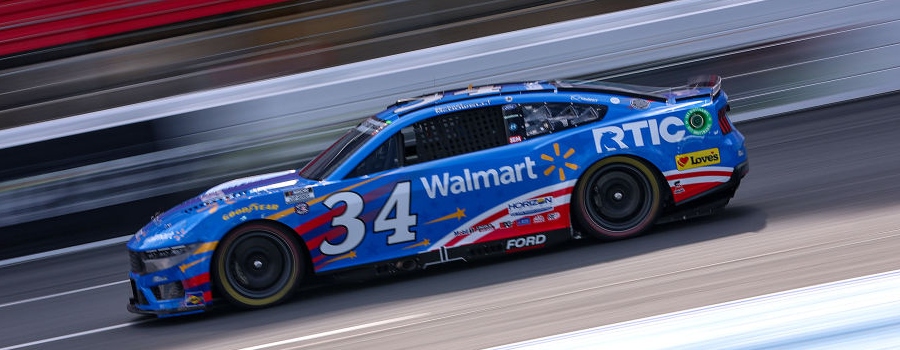World Wide Technology Raceway plays host to this weekend’s NASCAR Cup Series race.
Also known as Gateway, the 1.25-mile oval is relatively flat, with just nine and 11 degrees of banking in its two sets of turns. The NASCAR Cup Series, however, uses the intermediate package here, making this a relatively unique track due to its length, shape, size, and aero package.
That said, it appears track history has played itself out at least in practice and qualifying, as the main characters from the first two Gateway races look strong so far this weekend.
However, a longshot front row makes for an interesting slate, and a few unique ways to attack it.
Before we jump into my picks, don’t forget all my NASCAR projections can be found in the NASCAR Models on FantasyLabs, complete with floor, ceiling, median, and ownership projections.
Let’s not skip the best part — my Perfect% metric — a metric that tells you how often certain racers appear in the optimal lineup when running 10,000 race simulations.
And don’t forget about the tools that FantasyLabs has to offer, like our Lineup Optimizer to effortlessly create up to 300 lineups, or our Lineup Builder if you like to hand-build your lineups.
Here are my NASCAR DFS picks for the Enjoy Illinois 300 at Gateway.
Gateway DraftKings DFS Cash Game Strategy
Cash games could be tough this week given the front rowgett of Michael McDowell ($6500) and Austin Cindric. McDowell’s $6500 salary is low enough that even if he only leads a small handful of laps, he’s probably not going to kill us as long as he pulls off a top-15 finish. And he has the upside to lead much more as the polesitter.
I think we pick him for cash games and bring along the Team Penske teammates of Ryan Blaney ($10,800) and Joey Logano ($9300), who both rank inside the top four in my “track quality” metric. Blaney is likely to be the early dominator if McDowell isn’t, and while Logano starts in 12th, he was arguably the best car in practice.
Gateway DraftKings DFS Tournament Strategy
Tournament strategy becomes super interesting. If either McDowell or Cindric lead long enough to more than make up their salary, they can almost finish anywhere on the lead lap and have a shot at making the optimal lineup.
However, if neither does, it’s likely because a bigger-name driver is dominating, like Blaney or Denny Hamlin ($11,200).
Thus, I think we need to approach tournaments with two different build strategies.
In the lineups where we pick either McDowell or Cindric (and please set a rule to have one or the other, not both as it’s very unlikely to have both in the optimal thanks to both needing to dominate), we can probably reduce the amount of Blaney and Hamlin we use, thus setting a small negative correlation rule.
In lineups without McDowell or Cindric, we can bump up the amount of Blaney and Hamlin we use.
Drivers like Martin Truex Jr. ($10,500) and Logano don’t really fall under the correlation effect, as they are also able to grab plenty of place differential. And drivers like Christopher Bell ($10,000) or Tyler Reddick ($9700), while they start fourth and fifth, have enough combination of place differential and a cheaper salary that they probably aren’t too affected by whether McDowell or Cindric lead or not.
Additionally, if McDowell or Cindric ends up optimal, it’s because they grabbed a bunch of dominator points. That negates dominator points that high-dollar drivers get, so we can used a more balanced salary approach.
On the flip side, if they don’t dominate, we can grab some higher-dollar drivers and have to pay down for others, outside of Cindric and McDowell of course.
Based off the optimal percentages from my model, it seems like we should go around 15-25% on the McDowell/Cindric dominator approach, and the rest without them in a multi-entry portfolio.
While I think this slate is much more about strategy than actual picks, I do like Ty Gibbs ($8900) as a tournament play regardless of the approach used. Gibbs was strong in practice and has shown solid performance at similar tracks, especially Phoenix, which is probably Gateway’s best comp.
On the cheaper end, both Erik Jones ($7000) and Daniel Suarez ($6900) rank inside the top eight in my track-quality metric and start 22nd and 31st respectively. Suarez will likely garner more ownership, so Jones may be a solid pivot, but don’t go crazy here. I don’t project Jones for more than around 10% optimal, especially with the Stewart-Haas teammates of Chase Briscoe, Noah Gragson, and Josh Berry all slightly more expensive, but each with a better chance of ending up optimal than Jones.
Finally on the dirt cheap end, everyone is down on Harrison Burton ($5200). That said, he is in Penske-affiliated equipment and has an average finish of 24.0 while ranking ninth in my track-quality metric.







